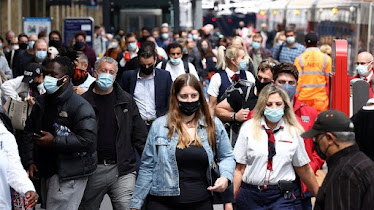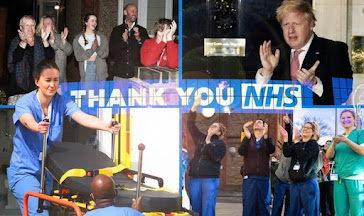It's astounding to observe how life has changed, post-pandemic. Although quickly forgotten, the progress of vaccinations and anti-viral treatments have been both expeditious and profoundly liberating. Social distancing, lockdowns and other social interventions seem like a distant memory, a trace of a distant life, inhibited, limited and, at times restricted to communications via new technologies and the incessant use of facemasks.
Like some kind of dystopian drama, this was familiar, day-in, day-out territory for people across la monde, a raison d'etre, for, what seemed like endless, protracted months.
Without question, we have much to be grateful for but we have short memories and time's velocity seems to shift as our perceptions alter and memories are negated to the back of our minds where others are prioritised and start to take precedence. Despite our collective successes we still suffer a malaise, a new uncertainty that reflects both our continuing fears of Covid and our successful adaptation to the pandemic.
Today, not everyone wants to engage with life as freely and sociably as they did. New technologies have enhanced communications and the impact on people's mental health is underestimated. We inhabit a postmodern, halfway house, a purgatory, if you a will where the risks versus our adaptations, where liberty versus the safety of societal withdrawal are all salient, life-altering and imbue contemporary life.
Even those who wish to embrace life in its entirety, proto-pandemic find themselves disorientated and puzzled by business, politics, social events, the arts, education and sporting events. Opportunities continue to be limited and the detritus of a far-reaching, once-in-a-lifetime pandemic limit our wellbeing and invite an anxious melancholia that flies in the face of the experiences of the gregarious and the adventurous.
Those of a more introspective and reserved nature may find their natural inclinations to self-doubt and reflection, become more intense and the oddity of a surreal, hyperreal life via new technologies too unreal and disconnective.
What is certain, is that every single one of us has been profoundly affected by the pandemic.
The negotiations, social interactions and the dynamism of the workplace have become compromised as duties by proxy have become a standard mechanism of everyday working life. Bureaucracy seems to have an infinite life, a simulated end in its self, hampering efficiency and impacting on services throughout society. If you've tried to see a GP recently you may well regard my points as salient, even cathartic when you recall your frustrations? This is just one example of long waits and compromised services throughout industries in all sectors.
Furthermore, the impact of home-working, largely initiated by the pandemic and then continued for reasons of cost-effectiveness, impacts heavily on communications. Like a technological game of Chinese whispers, the journey from an initial statement to the final instruction may alter course on several occasions or a statement may become lost in its entirety. The political consequences compounded by Brexit, the Ukrainian conflict, post-pandemic, economic fragility and interconnected worldwide markets, can result in extremely poor industrial relations.
The current industrial action in the UK, affecting many sectors has resulted in a typical stalemate, unmoving opposing sides crying out for consolidation. If we cast our minds back to the height of the pandemic, the compassion of the general public, the respect and celebration of frontline workers and the promises of politicians to award pay rises and greater respect for front-line workers and others that kept the country running, one can only feel perplexed and disheartened at such a quick turnaround of sentiment.
"Clap for carers" was a spontaneous, publically-initated show of appreciation for NHS staff, care home workers, teachers, unpaid carers and other front-line workers during the height of the Covid pandemic. Image from the Telegraph.
Misanthropy appears to be intrinsic to postmodernity. Of course, compassion is manifest in contemporary societies and many of us are lucky enough to witness it on a regular basis. My point is the increase of misanthropy, a distancing from ourselves and others, from nature and natural processes that invites both ignorance and a devaluing the reality of being human.
We have become so immersed in a post-pandemic reality of complex computerised systems, interactions via obligatory technologies and disproportionate, bureaucratic processes that we have become desensitised to the impact of these occurrences.
My descriptions are nothing new; computerised processes and overtly bureaucratic processes or, indeed a life of symbolism and representation that assumes greater significance than that, that it signifies, are all regularly occurring philosophical and artistic tropes. My observations are the rapid development of new technologies and their increasing use within societies and the distance that this puts between ourselves and others and ourselves and the environment.
Our reliance on machines, a la The Matrix, is troubling as the consequence of this dependency upon our own creations are not understood. There are ideas circulating about "fixing" aspects of our condition through computerized interventions. The problem with this is that it devalues our experience and places us secondary to our inventions - the non-human.
Healing, health and well-being often arise from inclusivity, actions that allow for interactions and activities with other human beings. Physical health is aided by fresh air and physical exercise not prolonged immersion in virtual environments. Mental health can circulate around purpose, an expression of individuality within the context of society. Accelerated change and the workplace becoming increasing technologically focused makes it more difficult to express our personalities within more limited roles. As aforementioned, the detachment from reality that overt use of new technologies can cause, can lead to anxiety and depression.
In addition to the above, distancing from the environment doesn't aid a comprehensive understanding of current concerns regarding global warming, the dumping of industrial waste, concerns about animal populations, etc. If we wish to address these concerns and encourage a mature attitude towards nature then the more time we spend within natural environments the better we will understand its value, importance and how to manage the natural world in a balanced and harmonised way. It's important to acknowledge that, rather than a bifurcation, the distinction between the artificial and natural will always be opaque.
In 2014, AMPB’s Candido Mezua and Norway's then–Minister of Climate and Environment, Tine Sundtoft, called for the inclusion of Indigenous rights in climate negotiations during the UN COP20 conference in Lima, Peru. Image and text from the Ford Foundation's website.
Mistreating the natural environment may seem like an over-extension of the concept of misanthropy, as our dislike is aimed towards nature rather than ourselves. However, as we put ourselves at risk when we damage nature the word misanthropy becomes more salient.
In balance my arguments may have been more negative than positive, a critical analysis always has a danger of painting an unnecessarily bleak picture, that may reflect the processes of writing and thought more than reality, the subject matter. Therefore, in the last part of this essay I wanted to, briefly reflect on the positive aspects of recent times.
Sporting and arts events have once again paved the way for societal healing, a celebration of diversity and a collective catharsis that celebrates cohesion, healthy competition, collaboration, human experience and invention.
Tony Iommi and Ozzy Osbourne performing at the closing ceremony of the Commonwealth Games, Birmingham, 2022. Taken from Blabbermouth.net
Culture, from the perspective of new technologies and science, from the bureaucratic and legislative frameworks that govern our contemporary lives, may seem a little quaint and oddly human. However, the arts and sport, conversation and the vital interactions that demonstrated compassion and positivity throughout the pandemic, helped us through Covid and out the other side.
Far from the idea that la condition humaine is problematic and needs fixing via artificial mechanisms, events such as the Commonwealth Games in 2022, both the men's and women's Football World Cups, arts festivals, open air performances and others all helped distract us from the difficulties we were facing and helped emphasise a path towards the post-pandemic.
The intelligence of the arts encouraged discussion and reflection, creative works often evoked the experiences of the pandemic through inventive ways. The feeling of a shared human experience through sport and the artistic performances that accompanied sporting events was palpable. By attending public events people may have taken their fist steps back into public places after the restrictions and lockdowns due to the pandemic.
It is precisely our ingenuity, our skills and ability to learn that can cause ourselves and our environment such crippling problems and, conversely help solve our problems. The Covid vaccinations and anti-viral treatments that were developed so quickly are testament to our ability to find inventive, powerful and compassionate solutions to devastating and far-reaching difficulties.
It's only through our most human of abilities, creativity, collaboration, learning and skills that such profound and beneficial solutions can be found. The notion of the human condition as an anomaly to be fixed opposes our intrinsic worth, our instinctive capacity for creativity and our innate empathy for other human beings. To "fix" our condition would starve ourselves of the positive aspects of our nature and would make us slaves to the manifestations of our own creativity.
Simon 2023.




No comments:
Post a Comment